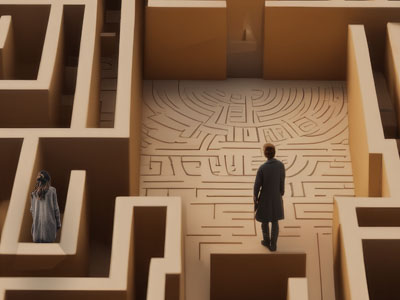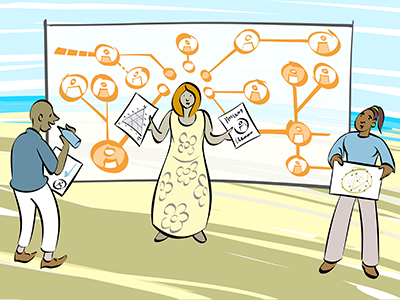Overview
Learn how to boost your team’s creativity by applying tools, mindsets, and techniques that enable collaborative innovation, support complex problem-solving, and unlock creative potential in diverse, transdisciplinary settings.
How do you spark creativity in others? How do you engage people from different backgrounds in a creative process? And how do you help a group move beyond the obvious to turn ideas into real impact?
According to the Future of Jobs Report 2020 by the World Economic Forum, the top skill for 2025 is analytical thinking and innovation. This means that in addition to being able to analyze information and use logic to address work-related issues, professionals must also use creativity and alternative thinking to generate new ideas and solutions.
Engineers are well trained in analytical thinking, but often less so in creative facilitation. This course brings the creative dimension into complex problem-solving. You will learn how to deliberately foster and guide creativity in group settings, particularly within inter- and transdisciplinary teams. While rooted in an engineering context, the course is highly relevant for any professional looking to boost team creativity in collaborative environments.
Combining hands-on practice with a strong foundation in creativity theory, the course emphasizes enabling others to be creative – not just developing your own creative skills. It focuses on leading a team through a structured creative process to approach problems from new perspectives, generate original ideas and solutions, and explore new opportunities. It also addresses what is needed to bring everyone onto the same page within an open and trusting environment of creative collaboration.
By the end, you’ll be able to help teams apply creativity deliberately – whether you are developing innovative concepts in a project, tackling complex challenges with a diverse group, or facilitating creative sessions.
Our Approach – What Sets Us Apart
This is not just another creativity course – it’s about creativity with others. Our unique approach emphasizes how to engage diverse teams in creative collaboration that leads to lasting impact. You’ll learn practical tools and principles that are immediately applicable, and that are designed to help you bring even skeptical colleagues on board with well-founded reasoning and compelling arguments.
Developed by TU Delft’s Faculty of Industrial Design Engineering, this course is based on 50 years of expertise in Creative Facilitation. It is consistently rated as one of the most valuable courses by our alumni, even a decade after graduation.
What You'll Learn
Upon completion of this course, you will be able to:
- Apply the fundamental principles of facilitating deliberate creativity in transdisciplinary group sessions.
- Identify the distinct mindsets and ground rules pertinent to the diverging, reverging, and converging stages of a creative process.
- Identify and explain success factors and barriers for deliberate creativity in meetings you attend in your daily job.
- Craft practical solutions or strategies to overcome the identified barriers.
Details
Course Syllabus
Module 1: About creativity
The first module will set out the Delft approach to creativity, including both historical and modern perspectives on creativity.
1.1 How creativity came about: A brief history
1.2 EXERCISE: When do you feel most inspired?
1.3 Creativity is …
1.4 EXERCISE: 4Ps in practice
1.5 Assignment: Quiz
1.6 The Delft approach to creativity
Module 2: Key factors for facilitating creative collaboration
This module will dig deeper into deliberate creativity and introduces key principles and practices for facilitating creativity in transdisciplinary group settings, combining theory with hands-on exercises.
2.1 EXERCISE: Define your context
2.2 Seizing the creative potential of a group
2.3 EXERCISE: What? So what? Now what?
2.4 Assignment: Quiz
2.5 3 principles for good facilitation
2.6 Assignment: matching scenarios
Module 3: Diving deeper into diverging
This module will be all about diverging and how to get the most out of this stage of the creative process.
3.1 What is diverging?
3.2 Ground rules for diverging
3.3 Exercise: practicing the ground rules
3.4 Various approaches to diverging
3.5 Exercise: practicing various approaches
3.6 Pitfalls and success factors
3.7 Assignment: Quiz
Module 4: Diving deeper into Reverging
This module focuses on reverging, the transitional phase between diverging and converging, and explores how to make the most of this crucial, often overlooked, stage in the creative process.
4.1 What is reverging?
4.2 Ground rules for reverging
4.3 Exercise: practicing the ground rules
4.4 Various approaches to reverging
4.5 Exercise: practicing various approaches
4.6 Pitfalls and success factors
4.7 Assignment: Quiz
Module 5: Diving deeper into converging
This module is about converging, which is about evaluating and focusing options. And explores how to make the most of this crucial stage in the creative process.
5.1 What is converging?
5.2 Ground rules for converging
5.3 Exercise: practicing the ground rules
5.4 Various approaches to converging
5.5 Exercise: practicing various approaches
5.6 Pitfalls and success factors
5.7 Assignment: Quiz
Module 6: Optimizing your next creative session
The final module brings together everything you have learned in a culminating exercise, helping you apply your skills in a real-world context to enhance future creative sessions.
6.1 Exercise: 'Reverge' your notes from your workbook
6.2 Exercise: Reflect on your learnings from theory and practic
6.3 Optimize your next session
6.4 Refine your facilitation skills
6.5 Personal goal setting
6.6 Tips for self-assessment and tracking progress over time.
6.7 Assignment / exercise
Qualifications
Chartered Engineering Competences
All our online courses and programs have been matched to the competences determined by KIVI’s Competence Structure, a common frame of reference for everyone, across all disciplines, levels and roles.
These competences apply to this course:
- A1: Extend your theoretical knowledge of new and advancing technologies.
- B2: Conduct appropriate research, and undertake design and development of new and creative engineering solutions.
- D2: Present and discuss proposals.
Admission
This is a Massive Open Online Course (MOOC) that runs on edX.
Prerequisites
While no specific prior knowledge is required, it is helpful if learners can draw on real-life experiences from their daily work as a context for applying and reflecting on the course content – such as team or project meetings, or collaborative sessions.


